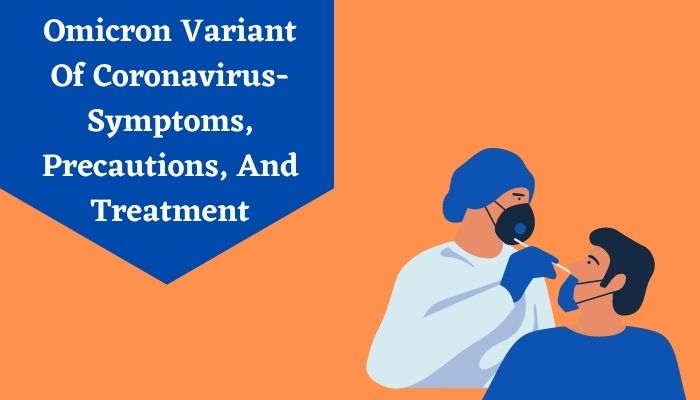Omicron Variant Of Coronavirus- Symptoms, Precautions, And Treatment
Over the past two years, the COVID-19 pandemic is dancing over our heads and is controlling life in the most possible ways. After the two deadly COVID-19 waves, life has just started to get back to normalcy because of vaccination. But suddenly, a new variant called Omicron has hit the world with a vengeance. This new variant is much more infectious than the delta and other variants and even fully vaccinated and previously infected people are also susceptible to this new variant.
The only good news is that all previous health insurance plans (indemnity and standalone policies) will offer coverage against this Omicron. Along with vaccination, a health insurance policy is also mandatory to enhance your protection against this new Omicron variant. Out of the best health plans for omicron, choose the one that meets your requirements and fits into your budget too.
What is the Omicron Variant?
The omicron variant (B.1.1.529) was identified on 24th November 2021, in several southern African nations. After a few days, the WHO designated this as a “new variant of concern” due to its several mutations. Since this variant is highly mutated, hence it is highly transmissible and even can escape all the possible immunity defenses. Thus, people who are vaccinated or who developed natural immunity from previous COVID-19 infection can also get attacked by this variant. Scientists and experts have not observed these types of mutations till now. That’s why they are researching more on omicron to understand its behavior and potential impact.

Earlier, it was claimed that this new variant was associated with an S-gene target failure on a specific PCR assay because of a 69–70del deletion, similar to that observed with the alpha variant. Omicron possesses many deletions and more than 30 mutations. Due to these deletions and mutations, this new variant can enhance transmissibility; have a higher viral binding affinity, and have a higher antibody escape. Since most Omicron mutations are not known, hence scientists can’t claim whether the full combination of deletions and mutations of this variant will impact the viral behavior and vulnerability to natural and vaccine-induced immunity or not. As far as the omicron variant precautions are considered, all the guidelines under the COVID Appropriate Behavior (CAB) should be followed to keep this virus at bay.
Omicron Symptoms
Omicron symptoms are classified into most common, less common, and severe symptoms.
Most common symptoms
The most common omicron variant symptoms are fever, cough, tiredness, body aches, headache, pain, and fatigue
Less common symptoms
Less common symptoms are diarrhea, a rash on the skin, discoloration of fingers or toes
Severe symptoms
Severe symptoms are difficulty breathing or shortness of breath, loss of speech or mobility, or confusion or chest pain
Though research is going on, symptoms related to this variant have been described as “extremely mild” by the South African doctor who first raised the concern over this new variant. The first omicron case of India (the South African national who already left the country) was completely asymptomatic and tested negative. The Bengaluru doctor with no international travel history, the Mumbai marine engineer who was not vaccinated, and the Gujarat NRI, etc. all omicron patients experienced mild symptoms.
At present, Omicron doesn’t cause any severe illnesses; scientists are still confused regarding its increased transmissibility.
Is Omicron more contagious than Delta?
The new variant was detected on 24th November and the World Health Organization declared it as the new variant of concern. Within a few weeks, more than a dozen countries grabbed this variant. Omicron has overpowered the delta variant in South Africa and other European countries. On 2nd December, South Africa reported 11,535 new coronavirus cases, a 35 percent jump from the day before, and the proportion of positive test results increased to 22.4 percent from 16.5 percent. The omicron variant is responsible for 73% of all sequenced genomes from positive COVID-19 tests in South Africa in November, according to the country’s National Institute for Communicable Diseases.

The UK reported 86 cases of omicron on 5th December, which makes 246 total cases of omicron in the country. On Saturday 4th December, the number was 160. So, there is a sharp 50% jump in these cases.
A total of 3,071 Omicron cases were reported in 27 States/UTs of India so far. Out of this, 1203 patients have recovered as per the Union health ministry. As a whole, India reported over 1, 41,986 lakh new COVID-19 cases, 285 deaths in the last 24 hours.
What to do if you develop symptoms of the Omicron variant?
The steps for omicron variant treatment are quite similar to those followed during earlier COVID-19 variants:
- Go for a COVID-19 RT-PCR test and isolate yourself
- If tested positive, a mandatory 7 days quarantine is needed
- Go for a teleconsultation from a doctor and start your treatment
- Select a well-ventilated room for your quarantine
- Practice breathing exercises
- Take your medications properly
- Get exposed to the sun during the early morning hours
If you experience any severe symptoms or breathing difficulties, consult with the doctor and get hospitalized immediately. Hospitalization due to COVID-19 will increase your bills manifold, thus, choose a health insurance policy that will compensate for all your treatment expenses. You can go for customized COVID-19 insurance plans like Corona Kavach, Corona Rakshak, etc. These COVID insurance policies will offer coverage against all variants of coronavirus, including this Omicron variant.
Do your existing health insurance plans support Omicron treatment?
According to the IRDA, all existing indemnity and standalone health insurance for COVID-19 will support the treatment and hospital expenses of Omicron. This is because Omicron is not a new disease; rather, it is just another variant of coronavirus. If you are diagnosed with the Omicron variant, your insurance will offer Omicron cover so that you can combat this disease without worrying about your finances. The health insurance cover for omicron on your existing insurance plans has made things easier for those who get infected by this virus and incur medical expenses for the treatment.
Tips to stay protected against Omicron
- Complete your vaccination as early as possible
- Always wear a mask that covers your nose and mouth whenever you go outside
- Wash your hands frequently with soap water or sanitizer
- Avoid all crowded places
- Open the windows for proper ventilation
- Sanitized the touched surfaces or areas
Conclusion
The COVID-19 cases are once again rising exponentially. So, don’t discard your guards and protections. Get vaccinated to stay protected against this variant. Finally, purchase a health insurance policy that will give you coverage for the COVID-19 so that you can comfortably deal with sudden medical expenses. Various insurance companies are already offering health insurance policies for omicron variants. If you don’t have a health policy, it is high time that you scroll through various health insurance plans for omicron and pick one after a careful study of features and coverage benefits.




























